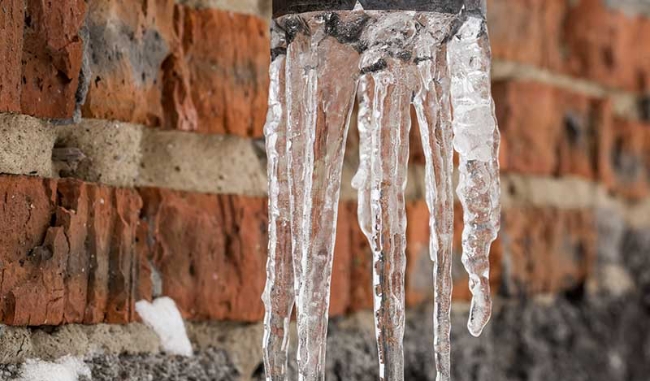Ways to Prevent Frozen Pipes in Winter: Professional Guidance
Ways to Prevent Frozen Pipes in Winter: Professional Guidance
Blog Article
Almost everyone maintains their personal perception on the subject of Prevent Frozen Pipes .

Cold weather can damage your plumbing, specifically by freezing pipelines. Below's exactly how to stop it from occurring and what to do if it does.
Intro
As temperatures decrease, the threat of frozen pipes rises, potentially causing pricey repairs and water damage. Recognizing just how to prevent frozen pipes is vital for homeowners in cold climates.
Comprehending Frozen Pipes
What triggers pipes to freeze?
Pipes freeze when exposed to temperatures below 32 ° F (0 ° C) for extended periods. As water inside the pipes ices up, it increases, taxing the pipe walls and possibly creating them to rupture.
Dangers and damages
Icy pipelines can cause water system disruptions, home damage, and pricey repair services. Burst pipelines can flood homes and create substantial structural damages.
Signs of Frozen Piping
Identifying icy pipes early can avoid them from bursting.
Exactly how to recognize frozen pipelines
Seek reduced water circulation from taps, uncommon smells or sounds from pipes, and noticeable frost on revealed pipelines.
Avoidance Tips
Protecting vulnerable pipelines
Wrap pipelines in insulation sleeves or utilize heat tape to secure them from freezing temperatures. Focus on pipelines in unheated or external locations of the home.
Home heating strategies
Maintain indoor spaces sufficiently heated up, especially locations with plumbing. Open cupboard doors to enable cozy air to distribute around pipes under sinks.
Securing Exterior Plumbing
Yard pipes and exterior faucets
Separate and drain pipes garden hoses before winter months. Set up frost-proof faucets or cover exterior taps with insulated caps.
What to Do If Your Pipes Freeze
Immediate actions to take
If you believe frozen pipes, keep taps open up to relieve stress as the ice thaws. Utilize a hairdryer or towels taken in hot water to thaw pipes slowly.
Long-Term Solutions
Architectural changes
Take into consideration rerouting pipelines away from exterior wall surfaces or unheated locations. Include added insulation to attic rooms, cellars, and crawl spaces.
Updating insulation
Invest in top notch insulation for pipelines, attics, and walls. Proper insulation helps maintain regular temperature levels and minimizes the danger of icy pipelines.
Final thought
Preventing icy pipes requires proactive actions and fast feedbacks. By recognizing the reasons, indications, and preventive measures, house owners can shield their pipes during cold weather.
Helpful Tips to Prevent Frozen Pipes this Winter
UNDERSTANDING THE BASICS: WHY PIPES FREEZE AND WHY IT’S A PROBLEM
Water freezing inside pipes is common during the winter months, but understanding why pipes freeze, and the potential problems it can cause is crucial in preventing such incidents. This section will delve into the basics of why pipes freeze and the associated problems that may arise.
THE SCIENCE BEHIND FROZEN PIPES
When water reaches freezing temperatures, it undergoes a physical transformation and solidifies into ice. This expansion of water as it freezes is the primary reason pipes can burst. As the water inside the pipe freezes, it expands, creating immense pressure on the walls. If the pressure becomes too great, the pipe can crack or rupture, leading to leaks and water damage.
FACTORS THAT CONTRIBUTE TO PIPE FREEZING
Low Temperatures: Extremely cold weather, especially below freezing, increases the risk of pipes freezing. Uninsulated or Poorly Insulated Pipes: Pipes located in unheated areas, such as basements, crawl spaces, or attics, are more prone to freezing. Insufficient insulation or lack of insulation altogether exacerbates the problem. Exterior Wall Exposure: Pipes running along exterior walls are susceptible to freezing as they encounter colder temperatures outside. Lack of Heating or Temperature Regulation: Inadequate heating or inconsistent temperature control in your home can contribute to frozen pipes. PROBLEMS CAUSED BY FROZEN PIPES
- Pipe Bursting: As mentioned earlier, the expansion of water as it freezes can cause pipes to burst, resulting in significant water damage.
- Water Damage: When pipes burst, it can lead to flooding and water damage to your property, including walls, ceilings, flooring, and personal belongings.
- Structural Damage: Prolonged exposure to water from burst pipes can compromise the structural integrity of your home, leading to costly repairs.
- Mold and Mildew Growth: Excess moisture from water damage can create a favorable environment for mold and mildew growth, posing health risks to occupants.
- Disrupted Water Supply: Frozen pipes can also result in a complete or partial loss of water supply until the issue is resolved.
WHY CERTAIN PIPES ARE MORE PRONE TO FREEZING
- Location: Pipes located in unheated or poorly insulated areas, such as basements, crawl spaces, attics, or exterior walls, are at higher risk of freezing.
- Exterior Pipes: Outdoor pipes, such as those used for irrigation or exposed plumbing, are particularly vulnerable to freezing as they are directly exposed to the elements.
- Supply Lines: Pipes that carry water from the main water supply into your home, including the main water line, are critical to protect as freezing in these lines can affect your entire plumbing system.
- Underground Pipes: Pipes buried underground, such as those connected to sprinkler systems or outdoor faucets, can be susceptible to freezing if not properly insulated.
https://busybusy.com/blog/helpful-tips-to-prevent-frozen-pipes-this-winter/

I'm certainly very fascinated with How to Prevent Your Pipes From Freezing and I really hope you liked our piece. Sharing is caring. Who knows, you will be helping someone out. I recognize the value of your readership.
Schedule Service Report this page